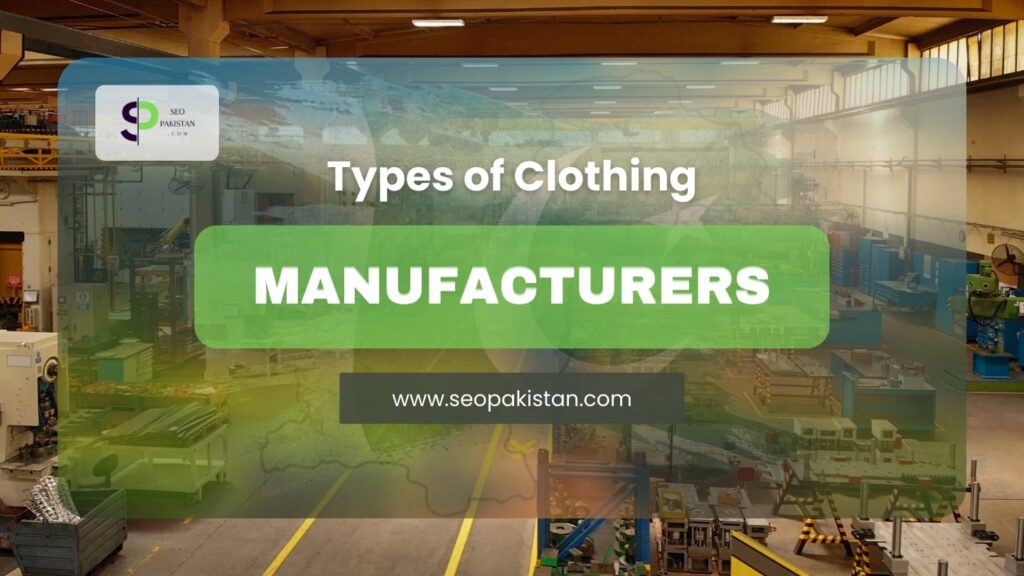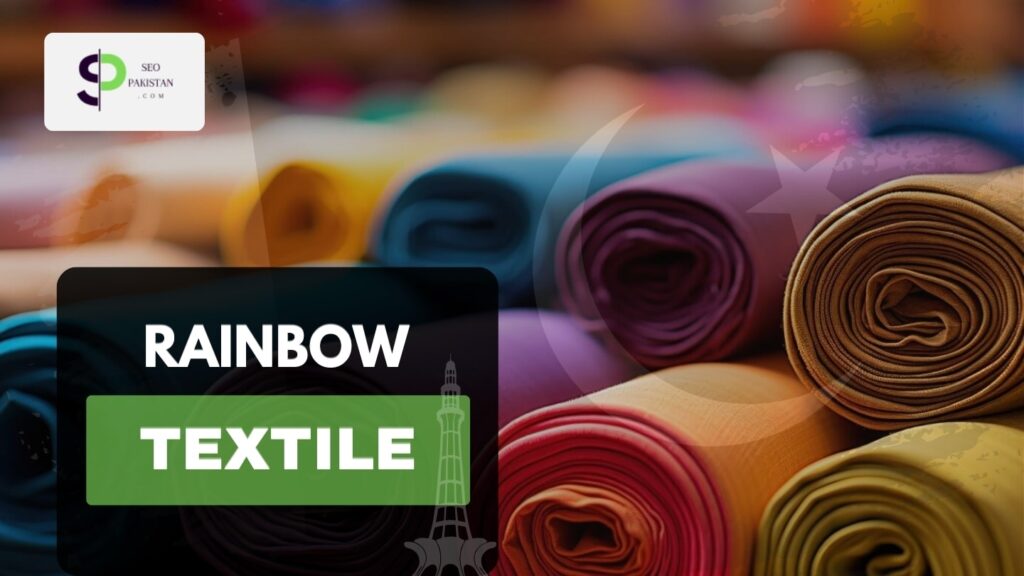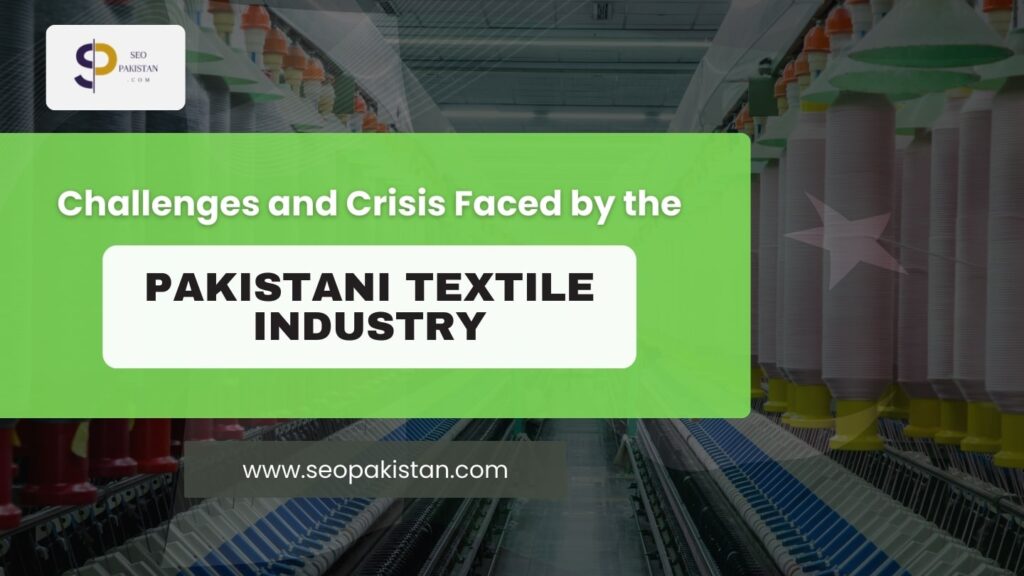Clothing manufacturers in Pakistan play an essential role in bringing fashion concepts to reality. They guarantee that each piece fits the required criteria by selecting high-quality materials and constructing well-designed clothes. Like many others, the garment sector contributes significantly to the country’s economic growth and development.
Pakistan has rapidly grown into a clothes manufacturing hotspot, attracting worldwide names and fashion lovers. With its rich textile legacy, experienced labour, and affordable price, the country provides a perfect setting for creating high-quality clothes.

The country’s apparel sector provides various styles and possibilities, from traditional handmade clothes to cutting-edge modern trends.
As global demand for sustainable and ethical production grows, Pakistan is responding by combining environmentally friendly methods and cutting-edge technologies into its manufacturing operations. This makes it a more appealing option for companies seeking to balance quality, price, and ethical sourcing.
In this article, we’ll briefly discuss the history, types, and leading clothing manufacturers in Pakistan and the challenges the industries face.
Table of Contents
History and Growth of Pakistan’s Textile Industry
Textile industries had massive growth throughout the 1950s and 1960s, with the establishment of large mills and factories. Most plants were in places like Karachi, Lahore, and Faisalabad. The industry grew further in the latter two decades, with large investments in advanced technology, establishing the nation as a competitive rival in the worldwide textile market.

During the mid-1990s and early 2000s, it struggled owing to global competition and fluctuating cotton prices. However, it reacted by growing into value-added products such as final garments, home textiles, and technological fabrics.
According to the latest survey, clothing factories account for almost 60% of the country’s exports, which made $5.2 billion. It contributes to around 46% of the country’s total production. It is evolving in response to technological improvements, more private-sector investment, and a greater emphasis on sustainability to fulfill the expectations of global customers. 423 textile industries are operating in the nation. Pakistan has a supply source for practically all synthetic and natural fibers and textiles, including cotton, rayon, and others. This availability of raw materials is a significant benefit for Pakistan since it reduces costs and operational lead times.
Types of Clothing Manufacturers

The manufacturing of clothing involves various stages required to complete a garment. It comprises steps such as cutting, stitching, and finishing. The manufacturing process is broken down into sub-operations required to build a specific garment. However, these methods could change based on the variety of tools available, the methodologies used, and the worker’s skills.
There are different types of clothing manufacturers.
CMT (Cut, Make, Trim) Manufacturers:
It is the most common method of garment production. As the name indicates, this type involves cutting, trimming, and sewing the garment into a finished product. In this scenario, the fashion brand provides the materials and designs. You’re asking the manufacturer to “assemble” the components you’ve provided.
As CMT manufacturers use the brand’s Specification Sheets, they do not devote time or money to operations like pattern/design creation. This enables them to focus on providing the most excellent quality cut, sew, trim, and stitch.
FPP (Full Production Package) Manufacturers
Being the one-stop shop, the FPP manufacturers manage the entire production process, from material procurement to final garment packing.

It may be a preferable alternative for fresher companies and those who want to have a manufacturer manage the entire process. A comprehensive fabrication package requires the clothes producer to find designs and materials.
As a result, the manufacturer is involved in all process stages. The maker will use their fashion industry skills to generate ideas from sketches and connect them with patterns and materials. FPP manufacturing is an excellent choice for many businesses, but the initial investment is more due to their additional services.
Top 5 Clothing Manufacturers in Pakistan
Pakistan has an array of expertise and creativity regarding the textile sector, which makes it an ideal location for apparel production. Here are the top-quality textile manufacturers in Pakistan valued for their quality, sustainability, and dedication to excellence.

ZK International
ZK International is Pakistan’s top custom apparel manufacturer, specialising in knitted and woven clothes made from organic textiles. This company provides custom clothing to brands, wholesalers, retailers, and designers by using pictures, sketches, and tech packs. Therefore, they have a long list of customers from prominent multinational businesses headquartered in the United Kingdom, the United States, Canada, and the European Union.
Their expertise guides and facilitates clients in understanding how to accomplish this. They offer mapping, designing, labels, tags, barcodes, and custom packaging facilities to well-known and startup brands.
However, the primary advantage of choosing this company is that they have some of the country’s lowest MOQs (minimum order quantity), allowing brands to purchase custom-made clothes starting at 50 pieces per style/design. ZK International manufactures shirts, t-shirts, hoodies, polos, bombers, denim, sports bras, leggings, and more.
They are known for their fast product turnarounds, ensuring timely delivery for their clients. Additionally, they provide meagre minimum order quantities (MOQs), making them suitable for large bulk orders.
However, they do not cater to high-end tailor-made garments, which may limit options for clients seeking luxury customization.
Rijiz
Rijiz is a renowned Pakistani garment maker with a track record of creating unique designs for businesses. The firm provides many beautiful bespoke styles, including screen printing and custom embroidery for cut-and-sewn garment manufacturing.
Being the prominent apparel manufacturer in Pakistan, Rijiz is recognized for its expertise in creating detailed and specialized clothing items. The company provides various custom styles with a strong history of delivering innovative and distinctive designs. These designs include screen printing, custom embroidery, and cut-and-sewn clothing manufacturing.
Regarding orders, their MOQs begin at 100 pieces per style, with an average production time of 30 working days. The manufacturer accommodates various payment methods and offers international shipping, making them an extremely accessible business partner.
Furthermore, the manufacturer demonstrates versatility by providing brands with a diverse selection of products. Whether you require exquisite custom styles of streetwear, gym wear, sportswear, fitness apparel, or jackets, they have a solution.
Experto
It was established in 2012 and works with many independent and established brands. Since it is one of the few firms that make various apparel goods. The organization is fully able to make any form of clothing. Regardless of the type of garment required, the company is well-equipped to produce it.
Experto is also recognised for its affordability, and with a highly skilled and competent team of specialists in-house, businesses may receive complete design help and advisory services. Registered wholesale clients can take advantage of huge discounts on bulk orders.
This textile industry makes various items such as t-shirts, jeans, sweatshirts, jackets, caps, shorts, and sportswear. It also features a range of customisation choices, like private branding, embroidery, sublimation, screen printing, and more. The organization may also undertake custom packaging, private labelling, and tag applications based on your needs.
Rainbow Textile
Another top-tier Pakistani manufacturer, Rainbow Textile, was founded in 1992. It is an all-in-one apparel garment company with a large client base in several foreign markets like the United States, Germany, the United Kingdom, and Australia.

They use cotton, blended as well as mixed quality to make garments of every size and color. Their attire ranges for men, women, and even children, including polos, sweatshirts, hooded coats, and more. The company also provide private labeling services, and their facility is fully equipped with cutting-edge technology.
However, they have limited eco-friendly products and do not offer low minimum order quantities (MOQs).
Extreme Sportswear
Extreme Sportswear, established in 2012, has worked with over 2,000 brands from Europe, North America, Japan, and Australia. Their main focus is providing practical training garments and sportswear for running, cycling, swimming, skiing, and snowboarding, among other activities.
Wholesale ready-made costumes are available for rapid customisation, and they come in various fabrics including cotton, spandex, nylon, Gore-Tex, and more. This enables clients to build unique cut-and-sew collections with greater ease than before.
In terms of adaptation, the manufacturer can use various production processes, including laser cutting, cutting and sewing, printing, and embroidery. Brands may order clothes in as few as 100 units per colour and design. The firm frequently uses organic cotton, recycled textiles, and other natural mixes in their product production.
Why choose Pakistani Clothing Brands?
Pakistan has continuously grown in the international market in the clothing and fashion industry in the past few years and earns up to 3.8 Billion per year. Due to their diverse culture, Pakistani clothing manufacturers are known for their heritage, diversity, skilful handwork, and unique designs. Several clothing brands appeared and ran online businesses in the last two decades, becoming prominent in no time.
From traditional outerwear like the salwar kameez or sherwani to the latest and trendy fashion, Pakistani clothing manufacturers have everything to offer everyone. They can design bright prints, luxurious styles, and fabric embroidery in almost all fabrics.
There are many advantages to choosing Pakistani clothes, and we will highlight some of them.
Affordable Costs
Pakistani clothing brands are generally affordable and easy to access. By maintaining a balance between price and fabric of the highest quality, Pakistani clothing manufacturers make outwear available to many people.
These clothing brands can be a one-stop solution for those looking for unique designs on a budget.
Many clothing brands also offer discounts on products during special occasions, like Eid, Christmas, Mother’s Day, Father’s Day, and December sales.
Another reason for these clothes’ low and affordable prices is that some brands sell wholesale.
They produce custom clothing and send it to the supplier using useless raw materials. The local market of Pakistan is crowded with skilled workers who work for lower pay.
High-quality Material
Pakistani brands have a proven track record of making traditional manufacturing products and producing high-quality goods to meet the needs of all seasons. There are different seasons in Pakistan, and there are several periods when you need to wear the stuff that matches the season. So, clothing brands must produce clothing for every season; Pakistani clothing manufacturers successfully fulfil customers’ demands.
Cultural diversity
Because of the rich cultural diversity of Pakistan, clothing manufacturers offer customized styles and samples for all provinces. They fulfil the country’s overall demand for beautiful clothes for all races, origins, religions, and cultures.
- For example, they made Shalwar Kameez, tailored to Punjabi culture.
- For Sindh, they design Choli, Lehnga, and Ajrik.
- Designers prove their expertise while making Turban and Taga for Balochistan.
- Clothing brand craft woven garments, Pashmina Shawls, and custom embroidery for Gilgit Baltistan
- Khyber Pakhtunkhwa’s resident likes to wear Khet Partug, so Pakistani brands make them all and offer custom solutions to every culture.
Skillful Handwork
When we look at the designs of Pakistani apparel, we can see every tiny detail of embroidery and clothing lines, giving them a stunning warm touch. Its creativity, magical handwork, and rich styles can be some of the reasons for the success of Pakistani clothes manufacturers.
Our designers are skilled in creating eye-catching designs, soft embroidery, and cultural patterns with their hands. They also use old and traditional techniques such as block printing, mirror work, custom packaging, and hand embroidery.
Challenges and Crisis Faced by the Pakistani Textile Industry
The textile industry is considered the largest export-earning sector of Pakistan. Textiles have accounted for almost 60% of Pakistan’s export profits and nearly 8.5 % of Pakistan’s gross domestic product (GDP) in the past few years.

But now, many challenges and crises face the textile industry, reducing its production and the country’s exports.
Here are some of the most common challenges.
High Cost of Energy
Energy is a basic necessity in manufacturing, but the continuously rising cost of electricity, gas, and fuel has become a significant and painful problem for Pakistani clothing manufacturers. High energy prices directly affect the overall cost of production and ultimately make Pakistani goods less competitive than those created in other countries with cheaper energy rates, such as Bangladesh or Vietnam.
With rising energy prices, profit margins for industries have decreased drastically. It becomes difficult for many companies to balance profit and expenses. According to the Sindh Assembly, 81 industrial units (10 textile and 5 sugar mills) were shut down due to an electricity crisis. That’s a very alarming situation.
Infrastructure Challenges

The Pakistani transportation network is outdated and unreliable, with poorly maintained or broken roads, inefficient railways, and overcrowding at main ports like Karachi. These issues are responsible for delaying the delivery of raw materials and finished goods, making it challenging for manufacturers to meet deadlines and appropriately send bulk orders to the suppliers.
This management inefficiency and lack of responsibility increases the business’s cost and discourages potential foreign clients or investors who only want well-organized and maintained infrastructure for smooth operations.
Strong International Competitors.
The Pakistani clothing brand and apparel industry also faces intense competition from other countries like Thailand, India, Vietnam, Bangladesh, and other developed countries in the international market.

If Pakistan does not have a proper investment flow, its apparel industry will remain the same, and machinery will not modernized according to the time.
Outdated Technology
Most of the Textile mills in Pakistan still use outdated technology and machinery, which require frequent maintenance. The obsolete technology also reduces productivity and efficiency, making it difficult for the industry to compete globally.
On the other hand, some leading garment manufacturers in Pakistan have started modern and up-to-date machinery and technologies like automated cutting machines, 3D prototyping, digital garment sublimation printing, and computerized pattern making, but most small and medium-sized businesses (SMEs) are still behind.
Conclusion
As the apparel industry is one of the largest industries, Pakistan earns billions of dollars, accounting for almost 8.3% of Pakistan’s GDP. If these industries run smoothly, they can change Pakistan’s future. In this article, we have discussed in detail the history of clothing, its different types, top custom clothing manufacturers, and the challenges that it has to face. Unfortunately, production is decreasing gradually due to various crises.
Still, there is no lait if the Government pays serious attention to this alarming situation and constantly manages and looks after all these matters, the problem can be solved in days, and these clothing manufacturing sectors can contribute even more to the national economy and increase its global competitiveness in the forthcoming years. To read more helpful and informational blogs, follow seopakistan.com.













